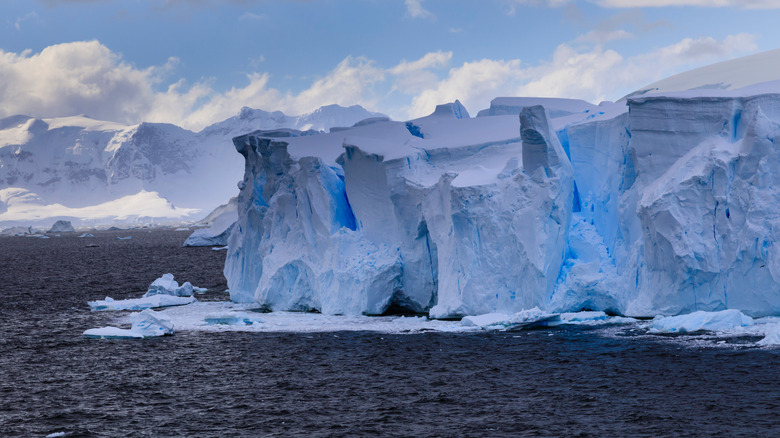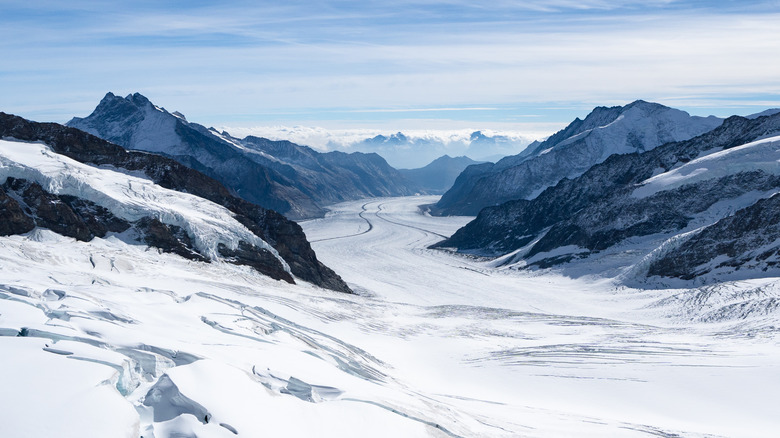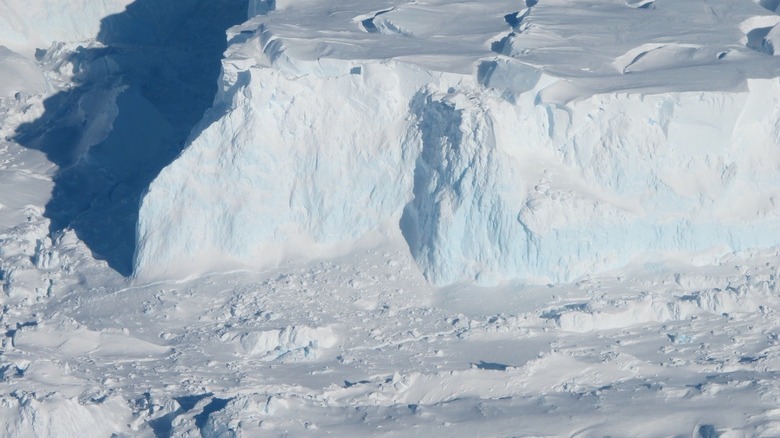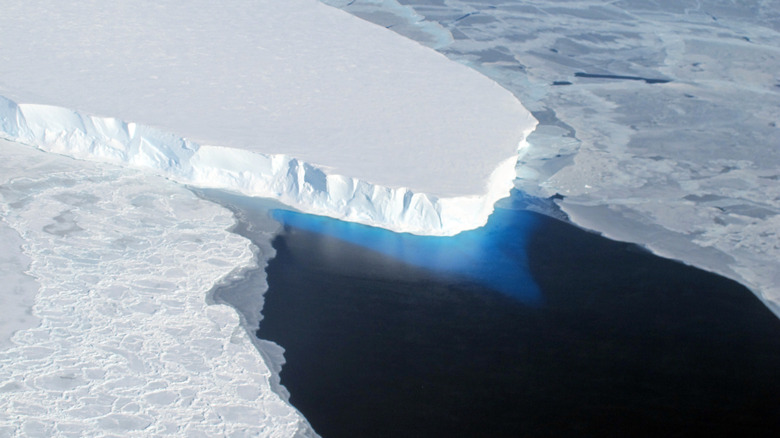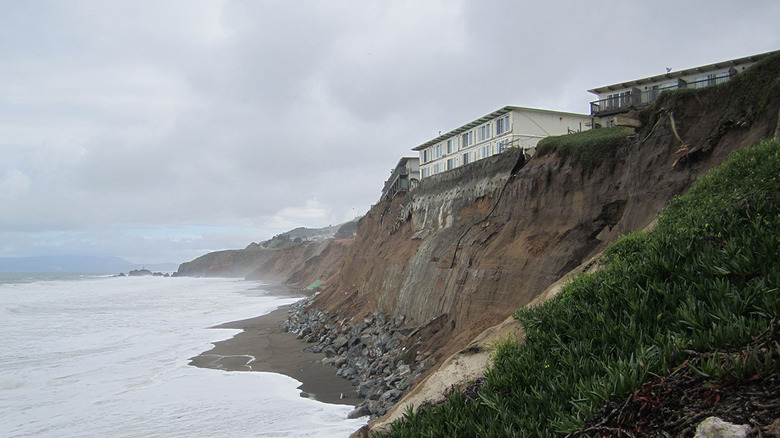Antarctica's Melting Doomsday Glacier Should Be A Wake-Up Call
Around 40 million years ago, as Antarctica drifted south, the thin tendril of land connecting it to South America opened up. At the same time, global carbon dioxide levels were falling, trapping less of the Earth's heat. The newly formed ocean current around Antarctica isolated the continent from the warmer waters of the lower and middle latitudes, exacerbating the cooling brought about by the dropping carbon dioxide levels. Soon, geologically speaking, snow that fell on its rocky expanse ceased to melt, even in the endless daylight of polar summer. The glaciers that once resided only on the mountains grew to cover the entire continent, turning what had been verdant green into a desolate white (via Insider).
Today, over 90% of the world's freshwater is locked up in the ice that covers Antarctica (from the Australian Antarctic Program), and the cold ocean currents that circulate around the continent play a crucial role in regulating the global climate. The Southern Ocean also plays a key role in removing carbon dioxide from the atmosphere — it's responsible for 40% of global ocean carbon dioxide absorption (via Norwegian Polar Institute).
Any change to the environmental processes on and around Antarctica would be felt on a global scale. To say that its stability is important to our way of life is a massive understatement. And yet, that stability is under threat, and we could pass a point of no return in as little as five years.
The lifecycle of a glacier
Glaciers are born from snow. If a region's average temperature is cold enough, snow doesn't melt, it accumulates. With every passing snowfall, its growing weight compacts the snow below it. At first, the snow is compacted into small granules of ice. As years pass and the weight of more snow continues to press in on itself, these small ice crystals are compressed into glacial ice. In Antarctica, this process usually takes over 100 years and 50 meters of snow (via AntarcticGlaciers.org).
By the time centuries of falling snow have accumulated enough to compact into glacial ice, its massive weight and the relentless pull of gravity move the glacier out and down. In the case of Antarctic glaciers, that leads inevitably to the sea. Some glaciers move faster than others (via Alaska Satellite Facility).
Where the glacier meets the sea, it will break apart, becoming an iceberg adrift in the ocean. Over the next decades, it will slowly melt and erode, lowering the salinity of the surrounding water (via Futurity), and infinitesimally (and inescapably) raising ocean levels around the world (via Iberdrola).
The Doomsday Glacier
Thwaites Glacier is one of the largest glaciers in the world. It's around 80 miles wide and encompasses 74,000 square miles, making it larger than the state of Florida. If it were to melt, waters around the world would rise by over 2 feet (via International Thwaites Glacier Collaboration).
Like most of the glaciers in west Antarctica, the majority of Thwaites Glacier sits in a geological depression that sinks below sea level. At its western edge, where it meets the open water of the Southern Ocean, Thwaites' advance is slowed by the lip of this geological bowl, known as its grounding line. This ridge, which is actually about a thousand feet below sea level, not only checks the advance of Thwaites, it prevents water from getting underneath the glacier and melting it from below (via Rolling Stone).
Thwaites is called the Doomsday Glacier because it buttresses other glaciers in west Antarctica. If Thwaites breaks apart and succumbs to the sea, we won't just be contending with a 2-foot rise in sea level from the loss of one of the world's largest glaciers. If Thwaites goes, it could set loose neighboring glaciers, making a 10-foot rise in sea levels all but inevitable (via Financial Times).
How long do we have?
One of the primary barriers blocking Thwaites Glacier from plunging into the sea is an ice shelf on its western edge. This tongue of ice floats on the water and had been unchanged for decades, but in recent years, cracks have been forming on its surface, hinting at increasing instability (via Space.com).
It's estimated that the ice shelf stopping Thwaites' advance could disintegrate in as little as three years. If that happens, Thwaites will accelerate its march to the sea, but whether its collapse will occur in a matter of decades or centuries is unknown (via Cooperative Institute for Research in Environmental Sciences).
We do have a better idea of the general trends in sea level rise, however. The National Oceanic and Atmospheric Administration estimates that the oceans around the U.S. coastlines will rise by up to a foot in the next 30 years. And barring any changes in global carbon dioxide emissions, the U.S. could be in store for up to 5 feet of sea level rise by the end of the century. Those numbers don't take into account the loss of Thwaites Glacier.
Why is sea level rise a problem?
One of the most visible consequences of a rising ocean is coastal erosion. Research has shown that 4 inches of sea level rise can result in the loss of nearly 50 feet of beach. That means that if the NOAA prediction of 12 inches of sea level rise in the next 30 years is correct, beaches worldwide could lose 150 feet to erosion. Some particularly vulnerable barrier islands in the U.S. are already losing 25 feet of beach each year (via U.S. Climate Resilience Toolkit). Some parts of the world, including the Maldives and Venice, may be underwater in a century.
Less visible is the loss of coastal habitats. Mangroves are rarely the focus of talks about sea level rise, but they act as vital buffers between the land and the ocean, mitigating beach erosion on one hand, and dampening the impacts of waves and storm surge, on the other. As beaches retreat further inland, so too do the mangroves — unless they're caught between the ocean and civilization, in which case the mangroves will disappear (via National Climate Change Adaptation Research Facility).
The loss of drinking water is another result of rising ocean waters. A rising ocean means that coastal flooding is a more common occurrence, especially during tropical storms. When that saline stormwater inundates the ground, it seeps into the water table, killing crops and salinating wells (via Earth.org).
What can be done
Responding to the impending rise of the ocean comes in two basic flavors: Addressing the root causes of sea level rise, and working to mitigate its consequences. The root cause of rising oceans is a warmer climate. As we pump more greenhouse gases into the atmosphere, more heat is trapped, the majority of which is absorbed by the ocean, which expands as a result. That warmer water hastens the demise of glaciers such as Thwaites, exacerbating the problem (via climate.gov).
In the U.S, carbon dioxide accounts for over 75% of greenhouse gas emissions. The majority of that carbon dioxide output comes from transportation (via U.S. Energy Information Administration). Therefore, the number one thing you can do to reduce greenhouse gases is drive and fly less, and take the bus and train more. You can also vote and advocate for policies that develop mass transit infrastructure and encourage its use.
But, because some degree of sea level rise is inevitable, communities also have to take steps to minimize its effects. Constructing seawalls and elevating roads are two solutions that are already being implemented in areas like New York. Some communities are investing in mangroves to help lock in their coasts. And some places, like Isle de Jean Charles, Louisiana, are simply packing up and resettling their community elsewhere (via Isle de Jean Charles).
